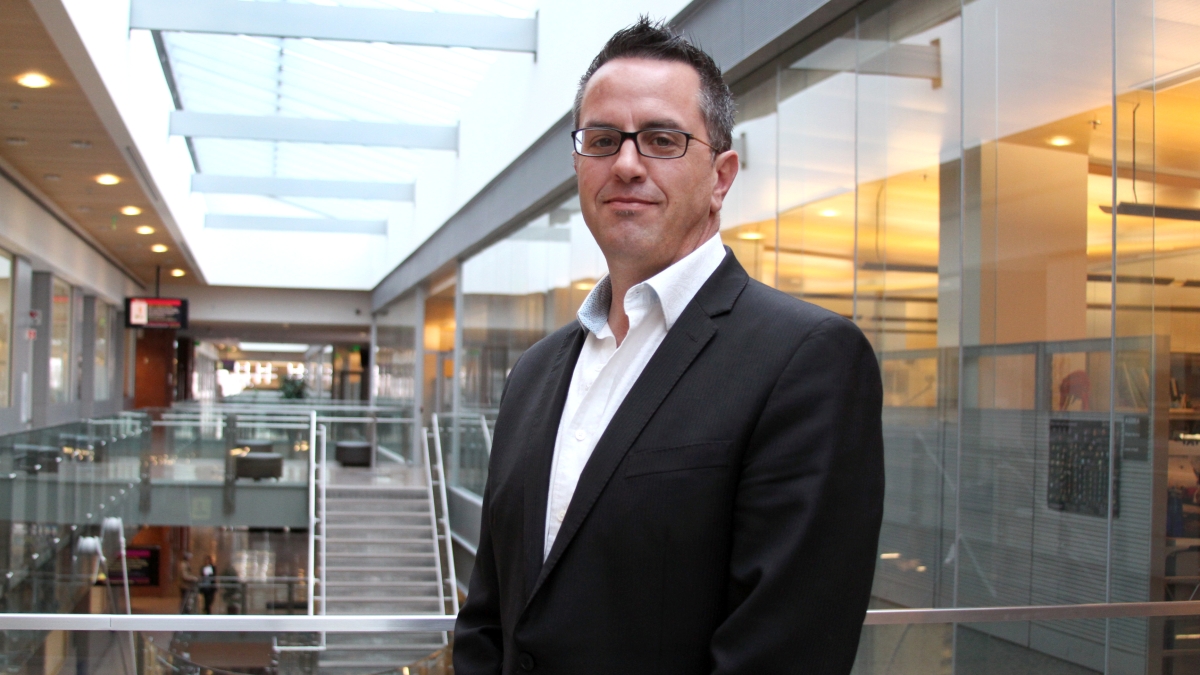ASU’s 100th spinout company individualizes cancer treatment

Joseph Blattman, a researcher in ASU’s Biodesign Institute who is leading the spinout effort.
Gemneo Bioscience, the 100th company to spin out from the ideas of ASU faculty and staff, will provide physicians with more optimal cancer treatments and immunotherapies to help improve cancer outcomes.
Currently, cancer patients often undergo a variety of regimens, that can all-too-often fail and further compromise the immune system, as physicians try to identify which treatments will work. The trial-and-error approach can increase painful side effects and take valuable time, which for cancer, can cost lives.
For the first time, Gemneo’s new gene-sequencing technology will enable true high-throughput, single-cell resolution of cancer, allowing physicians to better understand and tailor treatments around individual patients’ disease and immune responses.
Joseph Blattman, a researcher in ASU’s Biodesign Institute who is leading the spinout effort, worked with Professor Hao Yan to create the new immune cell profiling technology that identifies each patient’s unique tumor signature. The technology also identifies rogue cells that current technologies have not been able to detect. Additionally, it suggests key immune elements to exploit during immunotherapy.
“With cancer, the more diverse the cancer cells, the more difficult it is to identify the most effective treatment,” Blattman said. “Our technology will give physicians a more precise tool for more effectively treating cancer — and a host of other diseases.”
Blattman is a researcher in the Biodesign Institute’s Center for Immunotherapy, Vaccines and Virotherapy and is program director of the ASU School of Life Sciences microbiology graduate program.
“Our technology overcomes a major limitation of current deep-sequencing approaches, which struggle to identify particular combinations of immune receptors or cancer mutations,” Blattman said. “Gemneo allows us to interrogate individual cells to identify T-cell receptors and antibody sequences for diagnostics or therapeutic approaches, as well as rare combinations of cancer mutations occurring at the single cell level. In the future, this will facilitate personalized therapeutic approaches and better outcomes for cancer treatment.”
Anil Shrikhande, Gemneo’s CEO, founded the company while participating as an executive-in-residence with the ASU Startup Mill, which matches high-potential startups with seasoned venture capitalists and executives. Shrikhande previously led Rolls-Royce South Asia and Boeing India, as well as new venture development for Boeing Ventures.
“The Gemneo team is honored to be the 100th spinout company formed based on ASU’s extensive wide-ranging research efforts,” Shrikhande said. “This milestone is a testament to ASU’s longstanding commitment to excellence in research coupled with the unique innovation and entrepreneurial ecosystem that ASU has established to seed and nurture the creation of faculty and student ventures.”
ASU inventions have attracted hundreds of millions of dollars in external funding, including $96 million in FY16. Additionally, more than 500 people are now employed at ASU-linked startups. Overall, ASU has inspired or assisted in the formation or growth of an estimated 1,000 startups.
The announcement of ASU’s 100th spinout coincides with National Entrepreneurship Week and Phoenix Startup Week.
ASU’s venture development is led by Arizona Technology Enterprises (AzTE), which was formed in 2003 to serve as the university’s exclusive intellectual property management and technology transfer organization.
“University technology transfer has the power to grow the economy, create jobs and move life-changing innovations out of ASU’s research labs and into actual use,” said Augie Cheng, AzTE’s CEO and chief legal officer. “However, it takes more than signing a licensing agreement and wishing the new company luck. That’s why AzTE and its ASU partners have launched initiatives like the Startup Mill and the ASU California Center in Santa Monica to provide those missing pieces: the right training, the right partners, the right investors and the right business leaders.”
Since its formation, AzTE has developed into one of the nation’s top-performing technology transfer offices, across a range of industry metrics. In FY16, ASU faculty working with AzTE submitted 269 invention disclosures, initiated 13 startup companies and were issued 60 U.S. patents. Since 2003, AzTE has received more than 2,500 invention disclosures from ASU researchers and executed nearly 800 licenses and options.
More Science and technology

ASU technical innovation enables more reliable and less expensive electricity
Growing demand for electricity is pushing the energy sector to innovate faster and deploy more resources to keep the lights on…

What do a spacecraft, a skeleton and an asteroid have in common? This ASU professor
NASA’s Lucy spacecraft will probe an asteroid as it flys by it on Sunday — one with a connection to the mission name.The asteroid…

Hack like you 'meme' it
What do pepperoni pizza, cat memes and an online dojo have in common?It turns out, these are all essential elements of a great…

